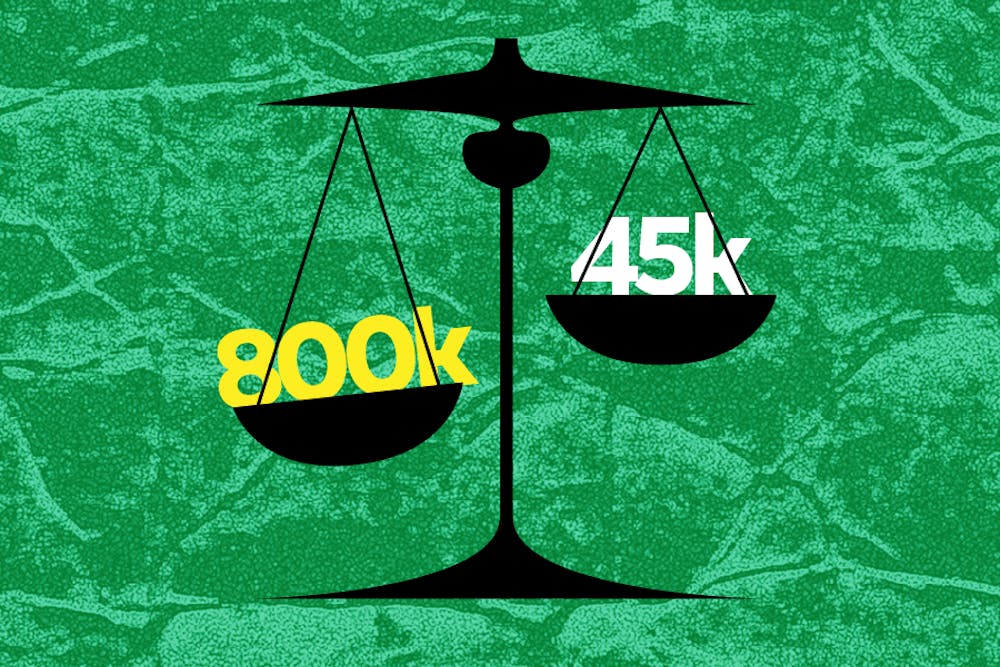
You’ve all seen the viral tweet.
But in case you missed it, on Jan. 19, 2022, legal studies and business ethics professor Nina Strohminger at the Wharton School tweeted that 25% of her students thought that the annual income of average American workers is over six figures, and one of them even thought it was $800k. She then commented by replying to her own tweet, “really not sure what to make of this.”
While a student in Strohminger’s class later admitted to submitting the $800k answer as a joke, 25% of her students still estimated the annual income of average American workers to be over six figures which is nearly double the actual number. According to the Bureau of Labor Statistics, the annual average of the median usual weekly earnings of full-time wage and salary workers in 2021 is $998 which approximate to just under $52k annually.
To be completely honest, if I was in Strohminger’s class and had to make an estimate, I would have likely guessed higher than $52k as well. This, in large part, has to do with my upbringing — including the school I attend and the people around me. Our cognizance of the world is often shaped by what we perceive on a day-to-day basis. A study published by the National Bureau of Economic Research found that people often rely on their own income level to estimate the average economic levels.
According to statistics published in The New York Times in 2017, the median family income of a Penn student is $195,500, placing our community in the 82nd average income percentile. Combined with the study above about people estimating average economic levels of others above, it is now easier to make sense of Strohminger’s tweet.
While the phenomenon is behaviorally logical, it is alarming that many of us within the community, not only at Wharton but at Penn in general, lack an accurate grasp of economic reality. It is certainly problematic when many of us hope to and will work in sectors that shape private and public economic policies. If those of us who will one day advise legislators, work at think tanks, or be penning policies themselves are growing further apart from the people whose exact livelihoods the policies will impact, then how can one work toward better economic equity? Furthermore, if a society lacks economic equity, then how is it conducive toward social equity?
Even for students who aren’t looking to create public economic policies as a career choice, the lack of general business knowledge is demonstrative of a disconnect between Wharton’s academia and its surrounding community. For comparison, the median household income of West Philadelphia in 2019 was $34,579, a sharp contrast to most families of Penn students. If Wharton’s academic endeavors failed to inform its students on basic business knowledge — a sense of society’s economic reality — how is it supposed to “develop leaders to change the world” as its website’s home page claims to?
This is an opportune moment for those leading the Wharton community to think about what they are hoping to impart to their students — what kind of leadership they are trying to foster, and whether our curriculum is lacking a grasp of the real world. Furthermore, is Wharton’s mission to help students become responsible citizens of the world grounded in reality, or is this simply a ruse on paper?
Concurrently, it is also beneficial for those of us within the Wharton community to think about whether Strohminger’s tweet is representative of our state of mind: Are we out of touch with the communities around us? While many may dismiss this issue and instead relegate it to those who intend to work in public sectors, one should not jump to make that conclusion. For example, if one hopes to work for a tech firm without an accurate sense of the state of American society, then who are those technologies built for — the few or the many? Similarly, if one is hoping to find success in the marketing industry, then they must have a sharp grasp of the socioeconomic reality of their targeted segment. Simply put, having basic cognizance of the society we live in is inevitably crucial, regardless of which walk of life we hope to enter.
Though one should not jump to generalize all Wharton and Penn students according to one survey from a single class, the phenomenon mentioned above is certainly worthy of attention and even alarm. Penn is an institution that has historically produced leaders of society, and will certainly continue to do so in the future. Those leading our community should reexamine what kind of leadership they are trying to foster for the world. Furthermore, this is a moment of introspection not only for the leadership of the school but also for us: Who are we becoming as a community, and who do we want to become?
JESSE ZHANG is a College and Wharton sophomore studying Marketing and Communication from Shenzhen, China. He is the DP’s photo editor. His email is zhexi@wharton.upenn.edu.
The Daily Pennsylvanian is an independent, student-run newspaper. Please consider making a donation to support the coverage that shapes the University. Your generosity ensures a future of strong journalism at Penn.
Donate






